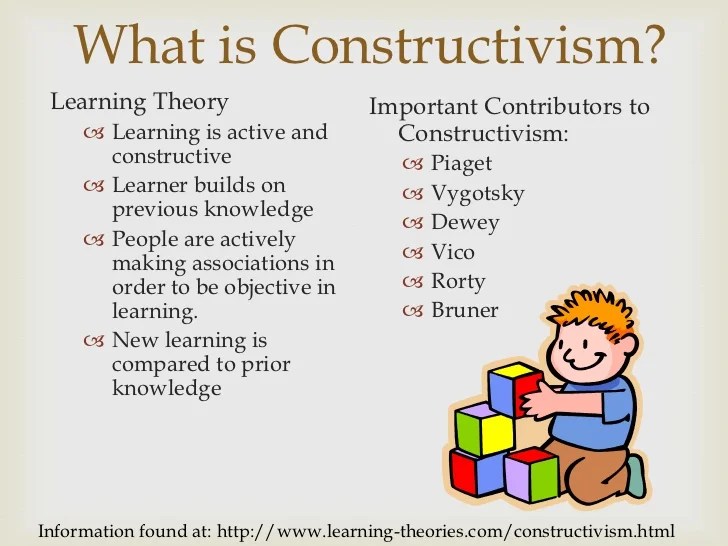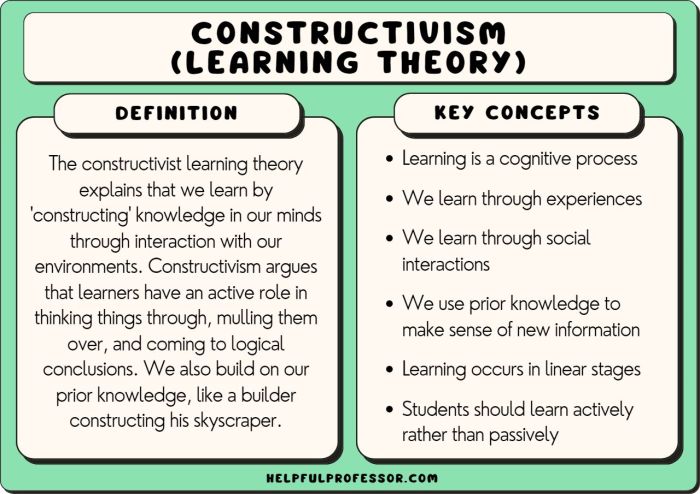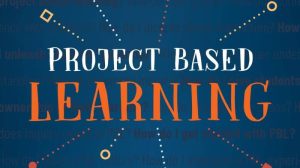
Embark on a journey exploring Constructivist Education, a method centered around hands-on experiences that truly shape learning.
Delve deeper into how this approach revolutionizes traditional teaching methods and empowers students.
Education Definition
Education can be defined as the process of acquiring knowledge, skills, values, and beliefs through various methods such as teaching, training, or research. It is a lifelong process that begins at a young age and continues throughout one’s life.Education plays a crucial role in society by shaping individuals into responsible and productive members of the community. It empowers individuals to think critically, solve problems, and make informed decisions.
Education also promotes social cohesion, economic growth, and cultural development within a society.
Types of Education
- Formal Education: This type of education is structured and systematic, usually provided in schools and universities. It follows a specific curriculum and leads to recognized qualifications.
- Informal Education: Informal education occurs outside the traditional classroom setting and is often self-directed. It includes activities such as reading, watching educational videos, or participating in workshops.
- Non-formal Education: Non-formal education is organized learning that does not follow the traditional schooling system. It includes programs like vocational training, adult education, and community-based initiatives.
Education Essay

When writing an education essay, it is important to include several key components to ensure a well-written piece. These components contribute to the clarity, coherence, and effectiveness of the essay, ultimately enhancing its impact on academic growth and learning outcomes.
Components of a Well-Written Education Essay
- Thesis Statement: Clearly state the main argument or point of the essay at the beginning to provide a roadmap for the reader.
- Evidence and Analysis: Support your thesis with relevant evidence and analysis to strengthen your argument and provide depth to your essay.
- Structure and Organization: Ensure your essay has a logical flow, with each paragraph contributing to the overall coherence of the piece.
- Critical Thinking: Demonstrate critical thinking skills by evaluating different perspectives and engaging with complex ideas in the field of education.
- Citations and References: Properly cite all sources used in your essay to give credit to the original authors and uphold academic integrity.
Contribution of Education Essays to Academic Growth
Education essays play a crucial role in academic growth by encouraging students to engage deeply with course material, develop their critical thinking skills, and articulate their ideas effectively. Through the process of researching, analyzing, and writing essays, students deepen their understanding of educational concepts and theories, enhancing their academic knowledge and intellectual growth.
Impact of Education Essays on Learning Outcomes
- Enhanced Understanding: Writing essays allows students to synthesize information, form connections between different ideas, and gain a deeper understanding of educational topics.
- Critical Thinking Development: By critically evaluating sources, analyzing arguments, and constructing well-supported arguments, students sharpen their critical thinking skills.
- Communication Skills Improvement: Education essays help students improve their communication skills by expressing complex ideas clearly and persuasively.
- Assessment of Learning: Essays serve as a valuable tool for instructors to assess students’ comprehension of course material, critical thinking abilities, and writing proficiency.
Education Games

Education games play a crucial role in enhancing the learning experience for students of all ages. By combining entertainment with educational content, these games help make learning more engaging, interactive, and effective.
Examples of Popular Educational Games and Benefits
- Math Blaster: This game helps students improve their math skills through fun and challenging activities, making learning numbers and calculations more enjoyable.
- TypingClub: Typing games like TypingClub help students enhance their typing speed and accuracy, essential skills in today’s digital world.
- SimCity EDU: This game allows students to build and manage their own virtual cities, teaching them about urban planning, problem-solving, and critical thinking.
Educational games not only reinforce academic concepts but also foster skills such as critical thinking, problem-solving, and teamwork.
Enhancing Student Engagement
- Interactive Learning: Educational games provide hands-on learning experiences that actively engage students in the learning process.
- Immediate Feedback: Games offer instant feedback on performance, allowing students to track their progress and adjust their approach in real-time.
- Competition and Collaboration: Games often include elements of competition and collaboration, motivating students to strive for improvement and work together towards common goals.
Education History

Education has a long and rich history that has evolved over centuries, shaping the way we teach and learn today. From ancient civilizations to modern societies, education has been a fundamental aspect of human development.Throughout history, education has undergone significant transformations and milestones that have paved the way for modern education systems. Key events and developments have influenced how we approach teaching and learning, reflecting the values and priorities of different time periods.
Ancient Education Systems
Education in ancient civilizations, such as Mesopotamia, Egypt, Greece, and Rome, focused on teaching practical skills, religious beliefs, and civic duties. For example, in Greece, philosophers like Socrates and Plato laid the foundation for critical thinking and philosophical inquiry.
- Ancient Egypt: Education was reserved for the elite, focusing on hieroglyphics, mathematics, and religious texts.
- Ancient Greece: The birthplace of Western education, emphasizing the importance of intellectual pursuits and physical education.
- Roman Empire: Education was geared towards producing responsible citizens and leaders, with a focus on rhetoric, law, and military training.
Medieval Education and the Renaissance
During the Middle Ages, education was primarily provided by the Church, focusing on religious teachings and Latin language skills. The Renaissance period marked a revival of learning and the arts, leading to the emergence of humanism and the spread of knowledge through printed books.
- Monastic Schools: Monasteries served as centers of learning, preserving ancient texts and promoting literacy among monks and scholars.
- Humanist Education: The Renaissance emphasized the value of individual achievement, leading to a focus on classical literature, art, and science.
- Gutenberg’s Printing Press: The invention of the printing press revolutionized education by making books more accessible, leading to increased literacy rates and the spread of ideas.
Modern Education Systems
The Industrial Revolution and the Enlightenment era brought significant changes to education, emphasizing standardized curricula, compulsory schooling, and the professionalization of teaching. The 20th century saw the rise of progressive education movements and advancements in technology that continue to shape education today.
- Industrial Revolution: The shift towards urbanization and industrialization led to the need for a standardized education system to prepare workers for the workforce.
- Progressive Education: Educational reformers like John Dewey promoted student-centered learning, experiential education, and social reform in schools.
- Digital Age: The integration of technology in education has transformed teaching and learning, providing new opportunities for personalized instruction and online learning platforms.
Education Film
When it comes to popular films, the portrayal of education plays a significant role in shaping our understanding of learning and teaching. These films have the power to influence viewers’ perspectives on education and inspire change in educational systems.
Portrayal of Education in Films
Many films depict the challenges and triumphs of teachers and students in the educational setting. From inspirational teachers who go above and beyond to reach their students to students overcoming obstacles to achieve academic success, these stories often resonate with viewers on a personal level.
- Dead Poets Society: This film explores the impact of an unconventional teacher who inspires his students to think for themselves and seize the day.
- Stand and Deliver: Based on a true story, this film follows a teacher who motivates his underprivileged students to excel in advanced mathematics.
- Freedom Writers: A teacher uses the power of writing to help her at-risk students find their voices and break free from the cycle of violence and poverty.
Impact of Educational Films
Educational films have the potential to spark discussions about the current state of education and inspire positive change. By shedding light on important issues in the education system, these films can encourage viewers to advocate for reforms and support teachers and students in their pursuit of knowledge.
-
“Film has the power to educate, inspire, and challenge our perceptions of education, making us rethink the way we approach teaching and learning.”
Films Inspiring Educational Change
There are several examples of films that have inspired real-world educational change by highlighting the transformative power of education. These films serve as a catalyst for innovation and improvement in educational practices.
- The Ron Clark Story: This film showcases the dedication and passion of a teacher who takes on the challenge of teaching in an inner-city school and makes a positive impact on his students’ lives.
- Waiting for Superman: A documentary that sheds light on the challenges facing the American public school system and advocates for educational reform to ensure all students have access to quality education.
- Won’t Back Down: Inspired by true events, this film follows a single mother and a teacher who fight to transform their failing school through a parent-trigger law.
Education Banner
Banners play a crucial role in educational settings by effectively communicating important information, promoting events, enhancing school spirit, and creating a visually appealing environment for students, teachers, and visitors.
Elements of an Effective Educational Banner
- Clear and Concise Messaging: Ensure that the banner conveys the message quickly and effectively.
- Visually Engaging Design: Use vibrant colors, high-quality images, and attractive fonts to capture attention.
- Relevant Information: Include relevant details such as event dates, time, location, and any other essential information.
- Durability: Choose materials that are durable and suitable for indoor or outdoor use, depending on the intended location.
Tips for Designing Engaging Educational Banners
- Know Your Audience: Tailor the design and message of the banner to resonate with the target audience.
- Use Eye-catching Visuals: Incorporate images, graphics, or illustrations that are visually appealing and relevant to the content.
- Keep It Simple: Avoid cluttering the banner with excessive text or visuals that may overwhelm the viewer.
- Call-to-Action: Include a clear call-to-action to prompt the audience to take the desired next step, such as attending an event or visiting a website.
Education Counselor
Education counselors play a crucial role in guiding students through their academic journey, providing support and assistance in making important educational decisions. Their expertise helps students navigate the complexities of the education system and plan for a successful future.
Role of an Education Counselor
Education counselors are responsible for assessing students’ strengths, interests, and goals to help them make informed decisions about their education. They provide guidance on course selection, career paths, and college admissions. Additionally, they offer support in addressing academic challenges and developing essential skills for success.
Importance of Counseling in Educational Decision-Making
- Counseling helps students explore their interests and passions, leading to more fulfilling educational experiences.
- Education counselors provide valuable insights into various career options, helping students make informed decisions about their future.
- Counseling can assist students in overcoming academic obstacles and developing effective study habits for academic success.
Tips for Becoming a Successful Education Counselor
- Develop strong communication skills to effectively connect with students and understand their needs.
- Stay updated on the latest trends and developments in the education field to provide relevant guidance.
- Show empathy and understanding towards students’ concerns and challenges.
- Build a strong network of resources to offer comprehensive support to students.
- Continuously assess and improve your counseling techniques to better assist students in achieving their goals.
Education Degree
Obtaining a degree in education opens up a world of opportunities for individuals looking to make a difference in the field of teaching and learning. Whether you are interested in becoming a classroom teacher, educational administrator, curriculum developer, or education policy maker, pursuing a degree in education can provide you with the necessary knowledge and skills to excel in your chosen career path.
Types of Education Degrees
- Bachelor’s Degree in Education: This degree is typically the first step towards a career in teaching. It provides a solid foundation in educational theory and practice, as well as hands-on classroom experience through student teaching.
- Master’s Degree in Education: A master’s degree in education allows for specialization in a particular area such as special education, educational leadership, or curriculum and instruction. This degree can lead to higher earning potential and career advancement opportunities.
- Doctorate in Education (EdD or PhD): A doctoral degree in education is ideal for individuals interested in research, academia, or leadership roles in education. It involves in-depth study and the completion of a dissertation on a specific educational topic.
Career Opportunities
With a degree in education, individuals can pursue a variety of career paths, including:
- Classroom Teacher
- School Administrator
- Curriculum Developer
- Educational Researcher
- Educational Consultant
Importance of Pursuing a Degree in Education
Obtaining a degree in education is not only important for personal growth and development but also for professional advancement. It equips individuals with the knowledge, skills, and expertise needed to make a positive impact in the lives of students and contribute to the field of education as a whole.
In conclusion, Constructivist Education proves to be a dynamic and effective way to nurture critical thinking skills and foster a lifelong love for learning.
FAQs
How does Constructivist Education differ from traditional teaching methods?
Constructivist Education focuses on hands-on experiences and active participation, whereas traditional methods often involve passive learning through lectures.
What are the key benefits of implementing Constructivist Education in classrooms?
Constructivist Education promotes critical thinking, problem-solving skills, and a deeper understanding of concepts through real-world applications.
How can teachers effectively integrate Constructivist Education into their lesson plans?
Teachers can incorporate group projects, experiments, and discussions to encourage students to construct their own knowledge and learn through experience.





